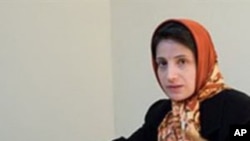The husband of a prominent Iranian human rights lawyer says she has been sentenced to 11 years in prison on charges that include security offenses and spreading propaganda against the country's rulers. Nasrin Sotoudeh was arrested in September and spent more than three months in solitary confinement in Tehran. She is believed to be one of the first attorneys jailed from the group that represented activists and political figures rounded up in 2009 during unrest that followed President Mahmoud Ahmadinejad's re-election. Her husband, Reza Khandan, said he learned from Sotoudeh's lawyers she had been convicted and banned from working as a lawyer for 20 years.
The New York-based International Campaign for Human Rights in Iran is among the groups that have spoken out against the sentencing. VOA’s Susan Yackee spoke with the organizations Executive Director Hadi Ghaemi.
Calling her one of the most prominent and brave lawyers of the post-election era in Iran, Ghaemi says that Nasrin Sotoudeh was also among the most outspoken lawyers who provided the outside world with a rare view into the Iranian judiciary. He calls the sentence handed down to her “draconian” and an attack on all human rights defenders and lawyers in Iran.
|
Listen to the full interview with Hadi Ghaemi:
|
According to Ghaemi, the sentence also demonstrates that the security and intelligence services have taken over the judiciary in Iran. He points out that even her interrogators repeatedly told her that they will not allow the judge in her case to issue a sentence shorter than ten years, regardless of what evidence would be brought against her.
The arbitrary nature of Sotoudeh’s sentence is self-evident, says Ghaemi.
“Especially, the five years given to her for not wearing a headscarf during a video-taped message is an indication of that. There is no justification for that, and also the charge of propaganda against the state and acting against national security stem from interviews and transparent activities she had done in the public domain in defense of her clients.”
Ghaemi says that as a lawyer Sotoudeh was working completely within the framework of existing law when she was trying to defend her clients.
With Sotoudeh’s case being as emblematic as it is, Ghaemi believes that it provides the UN and those players within the international community who are engaged with Iran on multiple fronts with an opportunity to put human rights abuses back into the forefront of negotiations with Tehran. Ghaemi feels that, unfortunately, rights issues have lately been overshadowed by the international focus on Iran’s nuclear ambitions.











